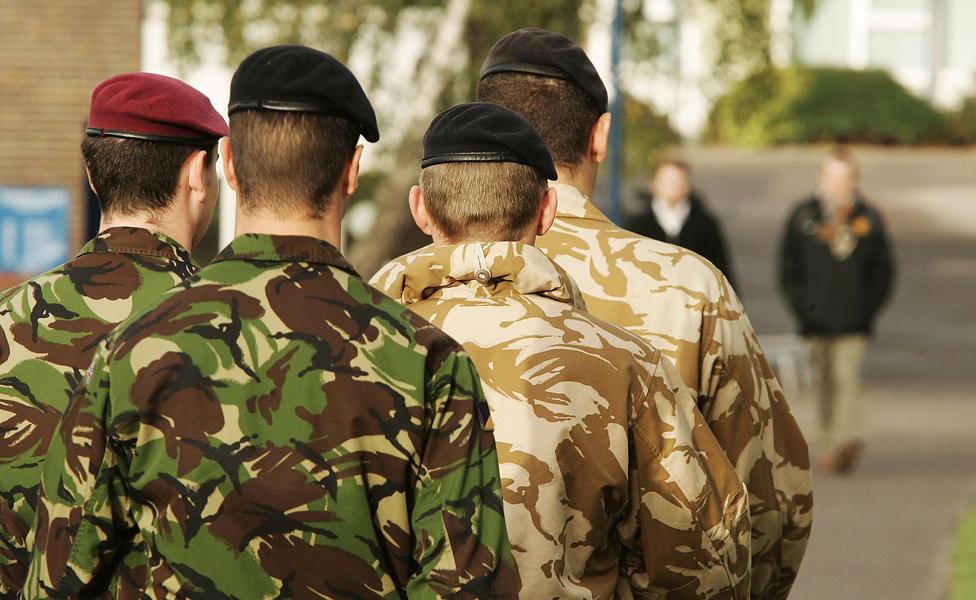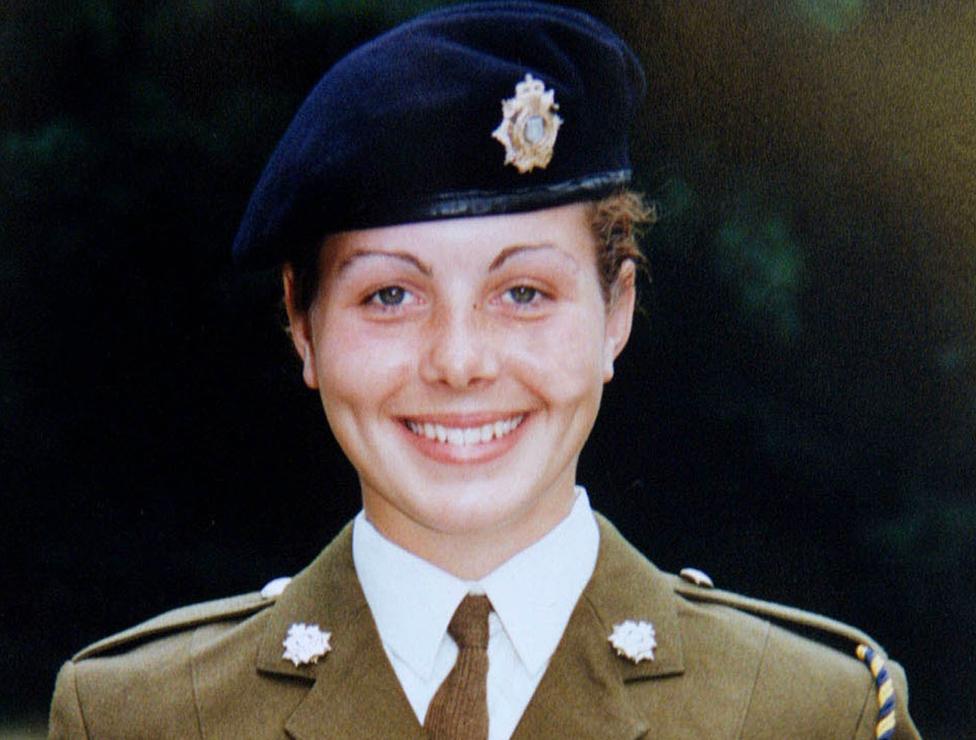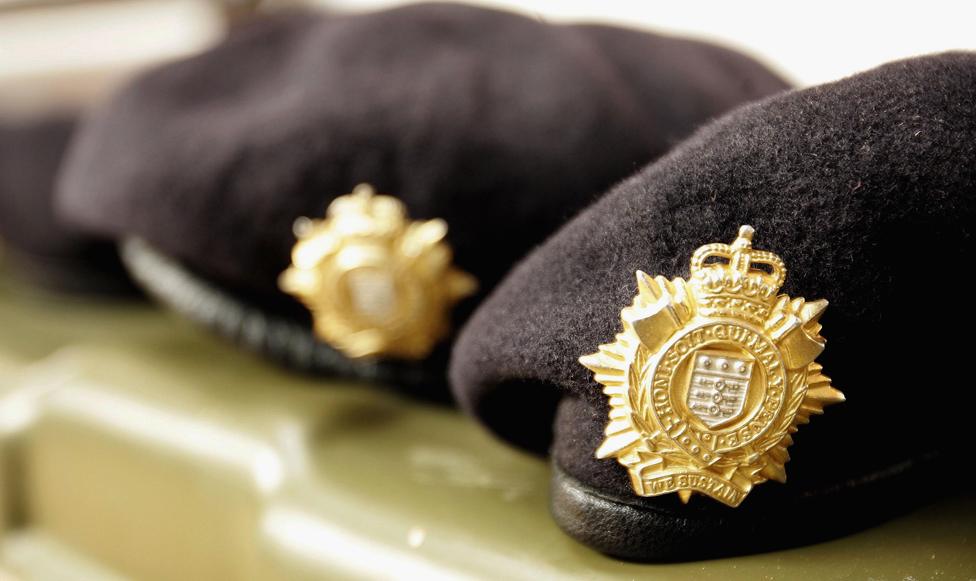The malevolent culture at Deepcut barracks
- Published

The menacing atmosphere at Deepcut barracks was the setting for physical, sexual and racial abuse, according to those who served there. In a BBC Two documentary, former trainee soldiers speak publicly about their experiences at the base.
Like Cheryl James they were there in the mid-90s. Deepcut has become synonymous with bullying, brutality and sexual harassment. During the inquest the Army acknowledged there was an abuse and misuse of power by some of those in charge of the mainly teenage trainees.
Dan Griffiths, now 38, joined up on the same day as Cheryl James in 1995. They were both 17 and did their 10 weeks basic training at Pirbright in Surrey. He says: "I'd always been that little Action Man as a kid and always wanted to join the Army." He describes the regime at Pirbright as "hard at the time but good fun."
After passing out, the recruits moved on to Deepcut barracks next door, headquarters of the Royal Logistic Corps. In contrast to the packed days at Pirbright, Dan Griffiths, like other rookie soldiers, found Deepcut an immediate disappointment. He remembers a camp with no structure. Instructors were mainly non-commissioned officers, corporals and sergeants. And some exuded fear and violence.
Dan Griffiths says the beating he received at Deepcut continued even after he'd been knocked unconscious
Dan Griffiths was small for his age, he weighed under nine stone. And he describes how one morning in the middle of a room inspection he was singled out by one NCO who used a broom handle to beat him unconscious. "He just came straight towards me. He didn't push me over with his hands, he just pushed me over with his body. You could see that he was angry and we didn't know why. He then stormed back out. Thirty seconds or so later he came back in with a broom handle. I felt the one hit, he broke my fingers and then he swung against my head and that's the last I remember really of that."

Find out more

You can watch Deepcut: The Army's Shame on Friday 3 June on BBC Two, at 21:00, or catch up afterwards on iPlayer.

He was later told by his roommates that the attack had continued while he lay unconscious. "I then learned that he'd gone into the broom cupboard and got the other half of the broom handle and come back in and then carried on, whilst I was unconscious, to beat me."
When he came round his attacker was gone and he was in agony with a large lump on his head, bruises all over his body and three broken fingers. "I remember walking to the medical centre in a lot of pain. It hurt. I remember not having the confidence to say what had actually gone on. So I just said that I fell down the stairs."
He says the culture at Deepcut was so intimidating that he wouldn't have contemplated reporting the attack. And despite his injuries he carried on with physical training.
"If you can imagine training with logs, doing lots of runs, lots of press-ups when your whole body is aching and there is nobody you can go to."
The next day he saw his attacker. "It was as if it didn't happen. It was just another day for him."

All the former Deepcut soldiers who have spoken to the BBC say that such behaviour went unpunished. They felt they couldn't report it to those instructors who were in charge of their welfare because they - or those close to them - were the bullies.
In the 1990s women had just begun training alongside men for the first time. At Deepcut this was said to have led to a predatory environment where sexual harassment was routine and for some there was worse. One female former trainee, anonymous in the programme and known only by the pseudonym Suzanne, says she was hooded and then raped by men who had come into the female accommodation block.
"I was like half asleep and then the next thing is I felt something being put over my head. I couldn't breathe and I started getting punched at first and I was getting held down."
Sobbing, she goes on. "I know there were definitely two of them. I was forced on and it just seemed to last for ages. I couldn't breathe. I tried to fight at first to get them off me but I couldn't. I was trying to tell them to stop but I couldn't because I was just held down."
Like Dan Griffiths, Suzanne, didn't report the attack.
"I didn't tell anyone. I was too frightened to. I was just scared because I didn't know who it was and you couldn't talk to anyone. I could have been going to tell somebody who'd been in that room. I still haven't been able to talk about if for the last 20 years."

For further information and support
For details of organisations which offer advice and support with sexual abuse, go online to bbc.co.uk/actionline or call the BBC Action Line to hear recorded information on 08000 934 999
Lines are open 24 hours and calls are free from landlines and mobiles

Julia Boulton was one of the few female non-commissioned officers, NCOs, at Deepcut in the mid-90s. She believes the base was out of control and she says of her fellow instructors:
"A lot of them were actually put there because nobody else wanted them. It sort of had a bit of a reputation of being a dumping ground to get rid of unwanted NCOs."
At 22, Dawn Benjamin was slightly older than most of her fellow recruits when she joined up in 1995. She says as the only black woman in her troop she was subject to racist abuse from one NCO at Deepcut.
And she describes being targeted during her basic training at Pirbright by an instructor who had eaten a banana. "I was told to take the banana peel and 'put it in my pouch you monkey'. So I took the banana peel and put it in my pouch."
Dawn Benjamin says the racist abuse she was subjected to in the army began during training
Dawn, now 44, says someone else reported this and the instructor was made to apologise. But the episode made her begin to question Army culture.
"I was quite wary and confused but I didn't want to give up." She stayed in the Army for eight years and says throughout her career she suffered abuse because of her colour.
Other female recruits tell of how instructors at Pirbright carried out serious sexual assaults on them. One says she was singled out on the day of her passing our parade while her family were on the base. She didn't tell them or anyone else.
In a statement the Army said: "We cannot comment on the allegations now being made by individuals who were at Training Establishments during this time, some or all of which may have previously been considered as part of civilian and military police inquiries. We would strongly encourage anyone who has not reported alleged criminal behaviour to contact the police."
Stressing that the Army has taken steps in the last twenty years to improve training facilities it added:
"We care deeply about our recruits and take our responsibility for their welfare extremely seriously. All Armed Forces training sites are now subject to independent scrutiny by Ofsted inspectors and their assessments help us to drive continuous improvement. Ofsted recently found all establishments to be either good or excellent.
"The Chief of the General Staff has been clear that creating a diverse, inclusive Army that treats all its soldiers with respect is one of its highest priorities and that the Army will not tolerate unacceptable behaviour in any form."

Contact us
Do you have a story or information about Deepcut or other military bases which you want to share with the production team who made the film? If you would like to speak to a member of the production team, you can send an email to: deepcut@bbc.co.uk
